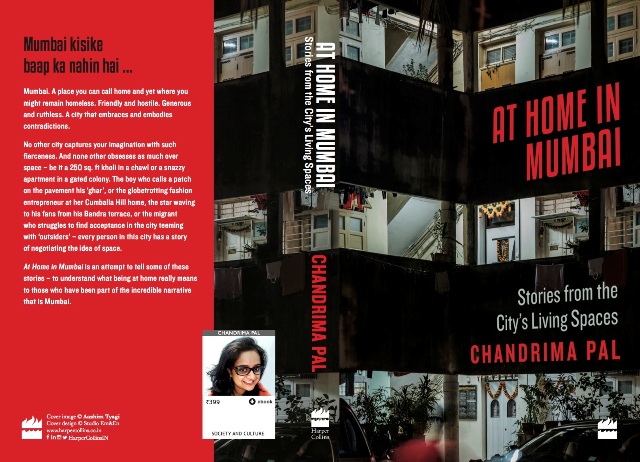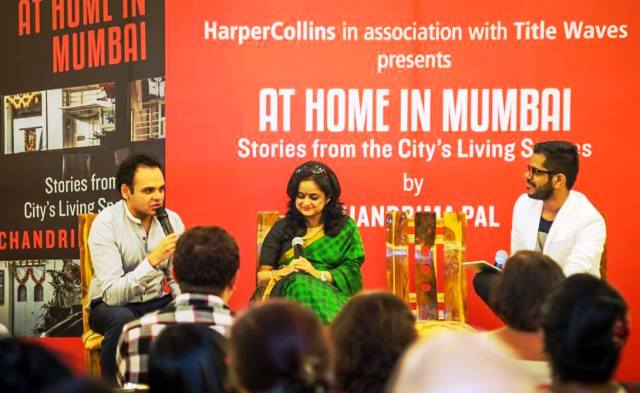
Mumbai is quick to absorb global ideas: Chandrima Pal
Propelled by the love for cities and living spaces, Chandrima Pal penned down 'At Home In Mumbai', a book dedicated entirely to people and properties in India's Financial Capital. Chandrima, who has herself lived in India's 'Maximum City' for over a decade, decodes her book in a chat with IBNS correspondent Sudipto Maity
Tell me, how many families did you quiz?
It wasn’t so much about quizzing the families as it was about spending some time with them. That was the idea of the project. In fact, in my first pitch to the publisher, I had said that ideally, I would like to spend some time with each of these families together, be a part of their celebrations, be a part of their conversations, be a part of some experience they could share, to get a better understanding of their relationship with their immediate physical living space. That is what I tried to do. I spent time with some 20 families, some of whom I had known earlier. It was a question of reacquainting myself with them, with the intention of putting together a story.

Is there anything that you found interesting but didn't use it in the book? If yes, why?
There were some stories which eventually didn’t make their way to the book. Some of them were similar in terms of experience or context or had a similar setting. I wanted to put in as much variety and range of emotions and delve into as many different kinds of experiences as possible.
How many months/years did it take you to write this book?
From the time the book was commissioned to the time I turned it into a manuscript, it took me around two and a half to three years to complete.
In these three years, did you ever take a break or did you just work every weekend?
It’s not a question of taking a break, because what had happened was, I had also two years ago moved to Kolkata. For me, it meant going back to Mumbai almost every month. Sometimes it would be a couple of days or more, spending time with the people I was working with.
You said and I quote: "There are two things that anyone living in Mumbai is concerned about. Getting famous and/or buying your own home. The first is fuelled by its beautiful and glamorous residents who have made the city more famous than the national capital. The second is a dream shared by all the people who have landed here from all over the world." What fuelled the writer in you to take up this particular topic?
Basically, something that fuels anyone who’s come to the city and try to find a place that they can call their home or even if they have been in the city to share a very peculiar kind of relationship with a place that they call their home. It was also born from my experience as a journalist, when I was working with Mumbai Mirror, the city tabloid. In the newsroom, I would get to hear and edit these incredible stories of surviving in the city. I remember this story about a leopard which had intruded into one of the homes in Borivali from the Sanjay Gandhi National Park. The story recounted the trauma of the family that was stuck in the same room as the leopard. The leopard for some reason felt extremely at home in that little corner. So, there are these incredible stories that one gets to hear. There’s one more I can recollect about a warring elderly couple. They had been married for almost half a century but never got along with each other, So, they had put up a wall in between their one small room that they shared. For me it was both tragic and kind of amusing to see people actually want to stake claim into a place which is no bigger than a floor tile, simply because they think it’s their home.

Mumbai is synonymous with space (or the lack of it!). According to you, is there any other place that comes close when the same parameter is taken into consideration?
I wouldn’t really know. I was born and raised in Kolkata. I have lived and worked in Delhi and I’ve spent more than a decade in Mumbai, living and working there and I also travel and work in Chennai and Bangalore…I do not see this obsession with space in any other city. Perhaps, that is also because at the end of the day it’s an island city and space is at a premium in Mumbai and has always been like that. Any growth in the city has always been in the vertical limits and down south, there is no place for you to expand any further, So, the city keeps on stretching longer and longer, almost like a rubber band. What happens when it grows vertically is, in the chawls, it was more about a community way of living. There was life on the streets, there was a certain kind of openness, more embracive of culture. The more you grow vertically and the more you have these exclusive apartments the more ghettoised you become. That is what is happening to the city. At the launch of my book, celebrity architect Ashiesh Shah made an observation. He said, ‘to begin with there were these seven islands, that made up the city of Mumbai and now we are looking at a possibility where there are going to be seven hundred islands, because, everyone wants their little exclusive space.'
You have lived in Mumbai for more than a decade now. Do you think the city has changed in terms of the composition?
Yes, and that is what I have written about in the book as well. It changed during the time I stayed. It had started changing even before I came and I think change is inevitable. Every city goes through it. Every city has its own pace and Kolkata is little slower perhaps, Mumbai on the other hand has been very fast. It’s always on the move and quick to absorb global ideas. A lot of it is also internal. From the time the riots happened and the polarisation happened, the communities started keeping to themselves and there was a breakdown in the cosmopolitan fabric of the city. The huge influx of migrants who had come down to the city for work, especially in the entertainment industry, led to a different kind of dynamics in the suburban parts of the city.
If you are to choose one out of this bunch that you have written, what would that story be?
Each story has been selected for its uniqueness, for a particular point of view and a difference in experience. It is not possible for me to choose any one story. I tried to handle each one as a story in itself
Finally, what's your plan for the future?
I’m toying with the idea of taking this concept forward, because, cities and living spaces fascinate me. If not along these lines, I would certainly like to do a book on Kolkata from a different perspective. As I was researching for my book and I may have mentioned in the introduction to this book as well, there was a time when it came to any kind of literary discourse, some of the greatest work about the country was almost dominated by works on Kolkata…All that has changed. Mumbai has been dominating that conversation.
There have been so many definitive books on Mumbai that have been written and it continues to fascinate people, simply because it has so many layers to it and there’s so much that can be explored about the city. Kolkata has fallen behind in that sense, because there are certain stereotypes that continue to define the city. I would like to go beyond the stereotypes, the labels and this whole thing about nostalgia, that the city is known for. Ever since I’ve moved back to Kolkata, after fifteen years, I have been trying to look beyond this dense fog of nostalgia that envelopes this city.
It’s nice in a way…Everything seems very romantic. It makes everything seems very alluring and also enigmatic in a certain way, but I think there’s more to it that just nostalgia. There’s a lot that this city has to offer in terms of its cosmopolitanism, its ability to shake people up, in its own way. I would like to give shape to that idea sometime in the future.
Support Our Journalism
We cannot do without you.. your contribution supports unbiased journalism
IBNS is not driven by any ism- not wokeism, not racism, not skewed secularism, not hyper right-wing or left liberal ideals, nor by any hardline religious beliefs or hyper nationalism. We want to serve you good old objective news, as they are. We do not judge or preach. We let people decide for themselves. We only try to present factual and well-sourced news.







